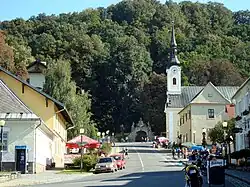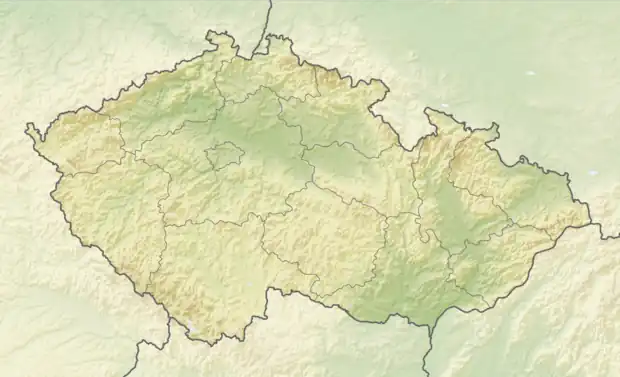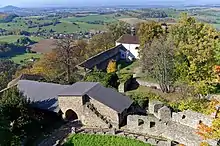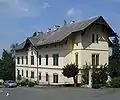Hukvaldy | |
|---|---|
 Centre of Hukvaldy | |
 Flag  Coat of arms | |
 Hukvaldy Location in the Czech Republic | |
| Coordinates: 49°37′26″N 18°13′19″E / 49.62389°N 18.22194°E | |
| Country | |
| Region | Moravian-Silesian |
| District | Frýdek-Místek |
| First mentioned | 1285 |
| Area | |
| • Total | 20.31 km2 (7.84 sq mi) |
| Elevation | 282 m (925 ft) |
| Population (2023-01-01)[1] | |
| • Total | 2,176 |
| • Density | 110/km2 (280/sq mi) |
| Time zone | UTC+1 (CET) |
| • Summer (DST) | UTC+2 (CEST) |
| Postal code | 739 46 |
| Website | www |
Hukvaldy (German: Hochwald) is a municipality and village in Frýdek-Místek District in the Moravian-Silesian Region of the Czech Republic. It has about 2,200 inhabitants. It is known for the ruins of the third-largest castle in the Czech Republic, Hukvaldy Castle, and is the birthplace of the composer Leoš Janáček.
Administrative parts
Villages of Dolní Sklenov, Horní Sklenov, Krnalovice and Rychaltice are administrative parts of Hukvaldy.
Etymology
The name is derived from the Hückeswagen family, who were the first owners of Hukvaldy.[2]
History

The Hukvaldy Castle was founded in the 1270s or 1280s by the Hückeswagen family and was first mentioned in 1285.[3] It was a guard castle on the trade route from Olomouc to Kraków. The settlement of Hukvaldy was soon established nearby. The settlement of Sklenov was established under the castle and was first documented in 1294.[4]
Between 1294 and 1307, the Hukvaldy estate was acquired by the bishops of Olomouc, who often pledged it to various noblemen. In the following centuries, the castle was expanded into a massive fortress. In 1762, the castle was destroyed by a fire.[5] [4] In the following decades, the castle was dismantled as a source of building material. Repairs began in the 1960s.[4]
The municipality was known as Sklenov until 1982. Since 1 July 1982, it has been named Hukvaldy.[4]
Demographics
|
|
| ||||||||||||||||||||||||||||||||||||||||||||||||||||||
| Source: Censuses[6][7] | ||||||||||||||||||||||||||||||||||||||||||||||||||||||||
Transport
The D48 motorway (part of the European route E462) from Nový Jičín to the Czech-Polish border passes through the northern part of the municipality.
Culture
Until 2017, Janáček's Hukvaldy music festival took place in Hukvaldy. Since 2018, it has been a part of the Leoš Janáček International Music Festival in Ostrava. It is one of the most important classical music festival in the Czech Republic.[8]
Sights

Hukvaldy Castle is the third largest castle in the country. It is gradually being reconstructed. There is an exhibition on the history and architectural development of the castle. Accessible are also well-preserved guard rooms, or the Baroque Chapel of St. Andrew used for concerts. Part of the palace was converted into a lookout tower.[5]
The castle is surrounded by a game park, founded in the 16th century. It is home to fallow deers, mouflons and wild boars. In the game park is an amphitheatre and the Monument of Bystrouška from Janáček's opera The Cunning Little Vixen.[5]
Notable people
- Jan Čapek of Sány (c. 1390 – c. 1452), nobleman and military officer; owned the castle and probably died here
- Friedrich Egon von Fürstenberg (1813–1892), archbishop of Olomouc; died here
- Leoš Janáček (1854–1928), composer
Gallery
 A bridge in Hukvaldy Castle
A bridge in Hukvaldy Castle Former archbishops palace
Former archbishops palace Church of Saint Maximilian
Church of Saint Maximilian
References
- ↑ "Population of Municipalities – 1 January 2023". Czech Statistical Office. 2023-05-23.
- ↑ "Hukvaldy castle". Hukvaldy Castle. Retrieved 2022-02-22.
- ↑ "Počátky hradu a jeho zakladatelé" (in Czech). Hukvaldy Castle. Retrieved 2022-02-22.
- 1 2 3 4 "Historie obce" (in Czech). Obec Hukvaldy. Retrieved 2022-02-22.
- 1 2 3 "Program rozvoje obce Hukvaldy na období 2021–2027" (PDF) (in Czech). Obec Hukvaldy. 2021-09-22. pp. 5, 39. Retrieved 2022-02-22.
- ↑ "Historický lexikon obcí České republiky 1869–2011 – Okres Frýdek-Místek" (in Czech). Czech Statistical Office. 2015-12-21. pp. 3–4.
- ↑ "Population Census 2021: Population by sex". Public Database. Czech Statistical Office. 2021-03-27.
- ↑ "About the Festival". Leoš Janáček International Music Festival. Retrieved 2022-02-22.